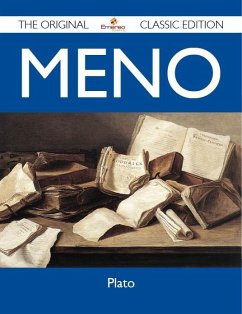To my mind the Meno is among the most mysterious of Platos dialogues. Beginning with a discussion as to whether virtue can be taught, the interlocutors move into an inquiry into the nature of knowledge itself. Here we get a famous scene in which Plato demonstrates his theory of knowledge as recollection through an illustration in geometry. This is principally a work of epistemology, but it remains a strangely oblique portrait of eidetic truth.
Meno is a Socratic dialogue written by Plato. It attempts to determine the definition of virtue, or arete, meaning virtue in general, rather than particular virtues, such as justice or temperance. The first part of the work is written in the Socratic dialectical style and Meno is reduced to confusion or aporia. In response to Menos paradox (a.k.a. the learners paradox), however, Socrates introduces positive ideas: the immortality of the soul, the theory of knowledge as recollection (anamnesis), which Socrates demonstrates by posing a mathematical puzzle to one of Menos slaves, the method of hypothesis, and, in the final lines, the distinction between knowledge and true belief.
Meno is a Socratic dialogue written by Plato. It attempts to determine the definition of virtue, or arete, meaning virtue in general, rather than particular virtues, such as justice or temperance. The first part of the work is written in the Socratic dialectical style and Meno is reduced to confusion or aporia. In response to Menos paradox (a.k.a. the learners paradox), however, Socrates introduces positive ideas: the immortality of the soul, the theory of knowledge as recollection (anamnesis), which Socrates demonstrates by posing a mathematical puzzle to one of Menos slaves, the method of hypothesis, and, in the final lines, the distinction between knowledge and true belief.
Dieser Download kann aus rechtlichen Gründen nur mit Rechnungsadresse in A, D ausgeliefert werden.


